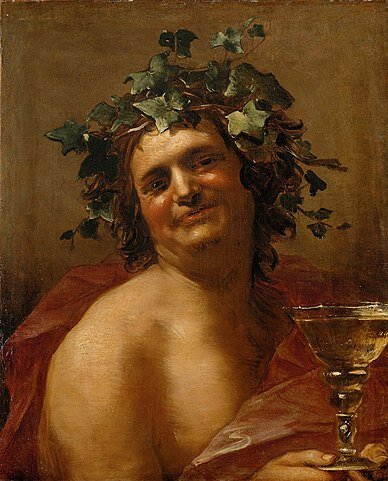The Roman festival of Bacchus, usually referred to as the Bacchanalia, was a series of feast days held in honor of Bacchus. This Roman god of wine, ecstasy, freedom, fruitfulness, and vegetation was always up for a party.
He represented a divine paradox: order found in chaos, freedom through ritual, and community discovered in celebration. His Greek equivalent was Dionysus and preceded him by several hundred years. The priests of Bacchus were women, men being forbidden from the priesthood by an old decree called the Senatus Consultum de Bacchanalibus.
For modern pagans, Bacchus continues to inspire. His mythology and worship emphasize inclusivity, ecstatic experience, and a profound connection to the cycles of nature. In this article, we’ll explore who Bacchus was, the role of his female priests, why his following was so open to all, and how we might honor him today in meaningful ways.
Roman God of wine and vineyards
Some Anthropologists have speculated that the wine was more than just wine. It was laced with herbs and plants that contained entheogens.
Who Was Bacchus?
Bacchus is the Roman counterpart of the Greek god Dionysus. His domain extended beyond simply wine—he presided over the grape harvest, fertility, theater, ritual madness, and ecstatic liberation. Bacchus was seen as a bringer of transformation: he could turn grief into joy, pain into catharsis, and isolation into communal bonding.
Legends tell us that Bacchus was a wanderer, traveling across the Mediterranean and spreading the cultivation of grapes. He was often depicted as a youthful, ivy-crowned god holding a thyrsus—a fennel stalk topped with pinecone, symbolizing both fertility and power. Unlike many Roman gods, Bacchus blurred boundaries: he was at once youthful yet wise, joyous yet terrifying, masculine yet androgynous.
This fluidity is part of what made him so appealing. Bacchus wasn’t confined by strict Roman societal structures, and neither were his followers. His worship was open to women, foreigners, slaves, and those often excluded from civic religious life. In him, people found not just a god of feasts and wine but also a patron of freedom and release.
Bacchus is included in our article Pagan Deities For LGBTQ+
Legend says that Bacchus wandered the earth sharing his secrets of winemaking with the women he met along the way. The consumption of wine has been a part of many rituals since ancient times. By the time of the Romans, viticulture was already an ancient practice with roots going back to ancient Iran and even China thousands of years prior.
Coloring books are available on Amazon in paperback and in our store/resources page in PDF
The Cult of Bacchus
The lavish rites in his honor were called orgia and won favor among the womenfolk, also called bacchantes. Many men opposed them and they were cursed.
Lycurgus of Thrace who opposed Dionysus and became blind and mad. Pentheus in Thebes opposed him and was torn to pieces by his followers. In Athens, men were rendered impotent for dishonoring the cult of Dionysus.
Everyone could participate, even if they were slaves, outlaws, or non-citizens. The festivals were open to the general public. The cult of Dionysus is ancient and believed to predate Greek civilization.
The Female Priests of Bacchus
His followers called the bacchantes were believed to have occult powers and superhuman strength when under the influence of their god. They also called him Bromios, which means Thunderer, and thought he incarnated in the bull they sacrificed to him.
These women served as his priestesses and devotees. They were often portrayed in flowing garments, crowned with ivy, carrying thyrsi, and dancing in ecstatic frenzy.
The Bacchantes represented liberation from the rigid roles Roman society imposed on women. In a world where women were expected to be silent, obedient, and confined to the household, Bacchus offered them a chance to step outside those boundaries. In ritual, they sang, danced, and shouted, embodying divine possession as they channeled the god’s wild energy.
Roman writers often described these rites with suspicion or fear, focusing on the frenzy of the Bacchantes and exaggerating their wildness. To the Roman elite, their ecstatic rituals represented chaos and danger. Yet to the participants, these rituals were sacred, transformative, and empowering.
The cult of Bacchus was significant in art and literature, and Greek plays, tragedies, and comedies were performed as part of the festivals.
The Bacchanalia were very popular, and there is evidence that they were well-organized events that took place throughout Italy. People saw the festival as an opportunity to throw off the shackles and inhibitions of everyday life in joyful and often inebriated celebrations.
In this video we celebrate October Pagan holidays, our kinship with spirit animals, spells, and learn about some magical plants.
Bacchus, intoxicants & entheogens
When the Romans conquered Greece, they brought many Greek customs and beliefs into Roman culture. The Dionysian Mysteries were rituals that are believed to have used intoxicants, entheogens, dance, and music to encourage attendees to shrug off social constraints and return to their natural primal state.
An entheogen is a psychoactive substance used in religious or spiritual contexts to induce altered states of consciousness. They can be derived from plants, fungi, or animals and have a long history of use in various cultures. They cause altered states of consciousness, mood, and behavior and were used for religious, shamanic, or spiritual purposes.
Entheogens were only used in sacred contexts and not abused as much as they are today.
Read my article Yule Plants and Ethnobotany.
Bacchus was thought to possess his followers during the rituals and free them of their inhibitions and the shackles of social rules and norms. It involved dancing, music, and free sexual activity.
It is thought that the intoxicants and the trance states during the rituals allowed the god to take possession of his followers and grant them ecstasy.
In the beginning, the wine, or sometimes Neolithic mead, combined with other herbs and entheogens, was traditionally consumed from a bull's horn. Some scholars believe that the cult first emerged around 6000 BC when people were learning how to make beer and wine. The Greek Eleusinian Mysteries and the Osirian Mysteries were parallels of the Dionysian ones.
The rites were usually held in the countryside and the mountains but sometimes in the Greek amphitheaters. Historians believe that they most likely arrived in Rome around 200 BC from Eretria and southern Italy. Bacchus is a deity of the harvest, and celebrations in his honor usually take place in early October. However, secret rituals were also held in March on the Roman Aventine Hill.
Modern Pagan Celebrations of the Festival of Bacchus
1. Create a Bacchic Altar
A simple altar for Bacchus might include:
Grapes, wine, or grape juice
Ivy leaves or vines
A thyrsus (you can make one by decorating a staff with ivy or ribbons)
Symbols of theater or masks
Candles in purple, green, or gold
Offerings of wine, honey, bread, or seasonal fruits are all appropriate.
2. Celebrate Through Dance and Music
Embodied worship is central to Bacchus. Put on music that stirs your soul and let yourself dance freely. Invite friends to join you in communal celebration. Singing, drumming, or chanting are also powerful ways to connect with his energy.
3. Share in Community
Bacchus thrives in community. Host a feast with friends, share wine or grape juice, and raise a toast in his name. Celebrate together, remembering that joy is magnified when it’s shared.
4. Explore Theater and Creativity
Because Bacchus was a patron of theater, engaging in creative arts—writing, painting, storytelling, or performance—can be a way to honor him. Create art that expresses freedom, passion, or transformation.
5. Embrace Inclusivity and Liberation
Perhaps the most powerful way to honor Bacchus today is to embrace his radical inclusivity. Stand up for the marginalized, celebrate diversity, and build communities where everyone is welcome. In doing so, we echo the ancient openness of his worship.
6. Seasonal Celebrations
You might also honor Bacchus during the grape harvest or at seasonal festivals that celebrate abundance. Late summer and early autumn are particularly appropriate times to hold a Bacchic ritual, marking the cycles of nature with joy and gratitude.
Some modern pagans usually celebrate the festival of Bacchus in October, but others celebrate it in March. Carnaval is a widespread festivity in many cultures that can be traced back to the Greco-Roman period of history and the festivals of Bacchus/Dionysus.
Think of the Mardi Gras in New Orleans, for instance. Perhaps the revelers wear masks not only to enrich the festivities but also to hide their identities from the authorities!
Those who have read the Chronicles of Narnia will be familiar with the person who led the celebrations when Aslan came to help the people of Narnia. CS Lewis describes him as "a youth dressed only in fawnskin, with vine -leaves in his curly hair. His face would have been almost too pretty for a boy's if it had not looked so extremely wild." His name was Bacchus!
The Birth Of Bacchus
Bacchus is the son of the god Jupiter and a human woman called Semele. In true Jupiterian fashion, their union was illicit because the god was already married to Juno. The latter did not take kindly to the affair and tricked Semele into seeing Jupiter in his proper form.
Unfortunately, Semele was overwhelmed by seeing Jupiter's power, and she was blasted with his thunderbolts and burned to ashes. Bacchus was still in his mother's womb, so Jupiter took the fetus and sewed him into his thigh until he could be born. Hermes, Mercury to the Romans, took Bacchus to the maenads of Nysa, and they brought him up.
The symbols of Bacchus
Items associated with him are the thyrsus, an ivy wreath, and a sizeable two-handled goblet called the kantharos.
The thyrsus was a giant fennel stalk topped by a pine cone resembling a spear and twined with grapevine leaves or ivy. It is a symbol of prosperity, hedonism, and fertility. Celebrants drank wine from the kantharos during the rites.
In the dancing of the revelers, the thyrsus was tossed between them. But there was a deeper mystery associated with Bacchus, known only to initiates. The Greek philosopher Plato wrote, "For many, as they say in the mysteries, are the thyrsus bearers, but few are the mystics".
Check out my video on the Roman God Bacchus
Rome’s Control
Very little is known of the rites of the Bacchanalia as the authorities of the time did not take kindly to them. What was written about them is mainly by outsiders who disapproved. Rulers maintained that they threatened the state, which is why the Roman Senate in 186 BC attempted to control them through legislation in 186 BC.
The Roman god of wine and fertility was originally called Liber Pater or the Free Father in Rome and was eventually assimilated into the cult of Bacchus. The word Liberalia was used to describe his festivities and the word Liber eventually became associated with Bacchus. There is evidence that the cult of Bacchus/Dionysus lasted for centuries before the Romans tried to exterminate it, and even after that, it continued in a less obvious fashion.
The Roman authorities saw the Bacchanalia as an excuse to break moral, civil, and religious law and ended up suppressing the cult throughout Italy. It arrested some seven thousand people, many of whom were executed. As a result of this persecution, the cult went into hiding and had to conduct its rituals in secret. People were forbidden from discussing what went on there.
Dionysus is the opposite of Apollo, the Roman god of reason, individualism, and intellect. The Bacchanalia were about human emotion and chaos free of reason. Bacchus is often depicted as being accompanied by satyrs, goat-like men with prominent erections.
Take Away
The Roman festival of Bacchus has wild roots in notions of unconstrained human freedom and pleasure. It reminds people of their primal nature and that the trappings of society are just that – trappings. It is a celebration of life, tomfoolery, passion, pleasure, renewal, and wine.
Author, Erik Olsen, studied Anthropology in college. Erik desires to be a Viking when he grows up and has worked in Outdoor Adventure leading hikes and rafting trips. A solitary Wiccan, Erik writes about Wicca, Norse religion, and making alters.








